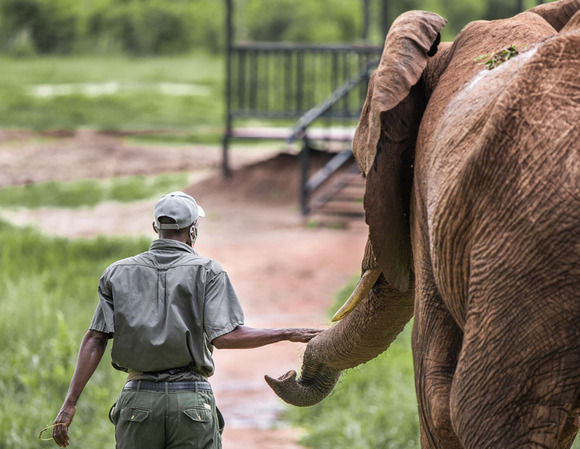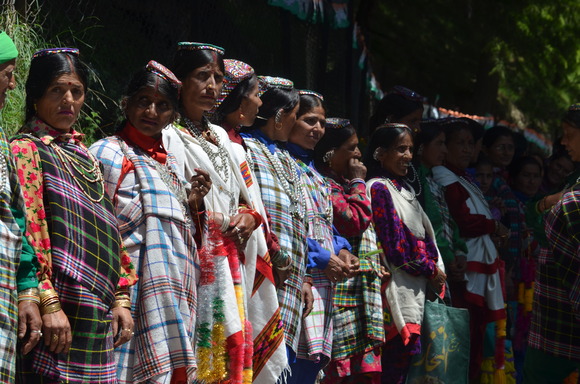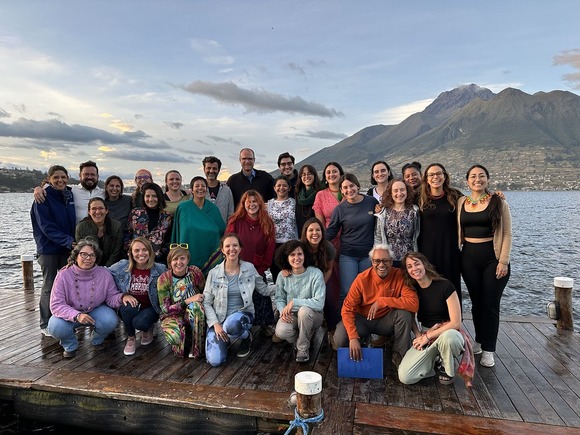
Submitted by Albina Mamedova on Thu, 29/02/2024 - 16:00
From grassroots pathway to biodiversity recovery; to Promoting pluricultural and intersectional Conservation Leadership in Latin America; and Guardians & Ambassadors: community-based capacity building for human-elephant co-existence in Zimbabwe, three Sansom Conservation Leadership Alumni (SCLA) Fund projects have been announced for the 2023-24 round.
The SCLA Fund, established with thanks to the generosity of Robert Sansom to support high-impact conservation projects undertaken by alumni from the University of Cambridge Masters in Conservation Leadership, is now in its third year. This year witnessed the highest number of applicants yet, with a total of seventeen applications received. The quality of applications was exceptionally high this year, making it a challenging decision for the panel. The majority of applications were submitted by alumni who graduated in the last year. Among these seventeen projects, three were selected for funding by a Selection Panel comprising individuals from the Cambridge Conservation Initiative and the alumni network.
Howard Nelson said: "As the Acting Director of the Conservation Leadership Programme, I am really thrilled to see the continued growth and impact of the Sansom Conservation Leadership Alumni (SCLA) Fund. This dedicated initiative underscores our commitment to empowering our alumni to spearhead conservation efforts worldwide. As we embark on another round of project selection, I continue to be inspired by the dedication and ingenuity demonstrated by our alumni in addressing today’s pressing biodiversity conservation challenges. I'm grateful to Robert Sansom for his continuing efforts to support the nurturing of our future conservation leaders''.
Guardians & Ambassadors: community-based capacity building for human-elephant co-existence in Zimbabwe
The project in Zimbabwe focuses on fostering collaboration between humans and elephants to promote co-existence in local communities. Through interactive workshops and practical training sessions with a unique herd of habituated elephants previously used in the elephant riding industry, local residents are empowered to become guardians of elephant-human harmony. The goal is to deepen understanding, reduce conflict, and pave the way for a more harmonious relationship between humans and elephants in the region. In the Kavango–Zambezi Trans-frontier Conservation Area, human-elephant conflict poses a significant threat, with elephant deaths from Problem Animal Control surpassing those from poaching. With human populations expanding into elephant habitats, such conflicts are expected to escalate, making the project vital for conservation efforts. By providing a unique opportunity to promote positive human-elephant interactions and foster a deeper connection between people and the natural world, the project holds immense conservation significance. The aim is to train 10 local participants in elephant community outreach and identify a suitable candidate to serve as a community Guardian. Essential tools, including a bicycle, GPS, and phone, will be provided to support the Guardian's role, with a monthly salary offered for their service. Regular reporting of elephant activities by the Guardian and the installation and upkeep of fences to mitigate conflicts effectively are key components of the project.
Grassroots pathway to biodiversity recovery
This project in South Asia addresses the funding gap for grassroots organisations, driven by limited awareness and capacity in conservation. It aims to support indigenous and local community-led initiatives by fostering partnerships and connecting them with external institutions. Through comprehensive assessments and dialogue, the project seeks to create adaptable mechanisms to advance grassroots efforts and ensure lasting impacts on biodiversity. Key activities include identifying grassroots organisations, conducting interviews, and facilitating workshops to address systemic issues. The project will lead to an active coalition working to further biodiversity conservation, providing support to ten grassroots organisations and showcasing grassroots-led initiatives to gain appropriate funding. Expected outcomes include insights into grassroots organisations, a comprehensive report guiding conservation initiatives, and long-term support for grassroots development and conservation programs.
Promoting pluricultural and intersectional Conservation Leadership in Latin America
This project in Latin America aims to establish a conservation leadership program that empowers local leaders and promotes gender equity and wellbeing. It seeks to legitimise traditional knowledge, address language justice, and build a strong regional network for biodiversity conservation and climate resilience. The program aims to offer inclusive training with a decolonisation perspective, focusing on local leaders' empowerment, particularly women and non-gender conforming individuals. Key activities include establishing a working group, co-creating educational resources, and running a pilot program with a focus on knowledge exchange. The project aims to create a supportive network of conservation leaders, amplify the voices of marginalised groups, and fortify biodiversity conservation efforts in Latin America. Expected outputs include the establishment of a decolonised regional leadership program, a knowledge exchange hub, co-created communication materials, and support for the wellbeing of conservation leaders.
Updates from the SCLA Fund: Conservation Education in the Brazilian Pantanal Project Completed August 2023
The Conservation Education project in the Brazilian Pantanal, supported by the SCLA Fund, concluded successfully in August 2023. This initiative aimed to promote knowledge and care for nature among local communities in the Pantanal region. Through workshops, field trips, and educational material distribution, the project empowered teachers to educate thousands of children about the Pantanal's ecological importance and threats. Notably, the project exceeded expectations, reaching eight times more teachers and tripling the number of participating children. It also enhanced the organisation's visibility and credibility, positioning it as a reference for environmental education in the region. The project's success underscores the critical need for such initiatives and highlights the potential for collective action in biodiversity conservation. Follow-up initiatives are underway to further enrich environmental education efforts in the Pantanal.



